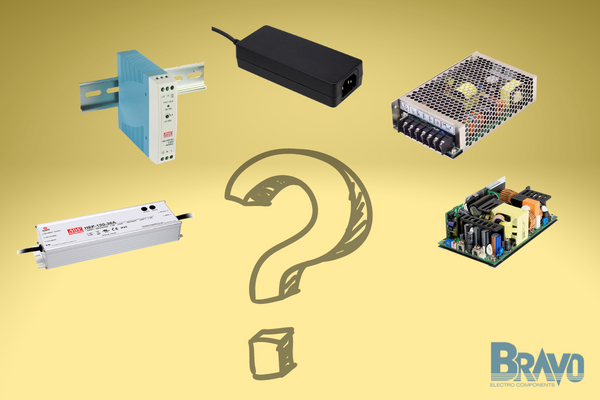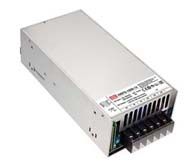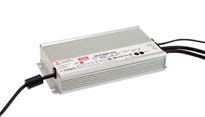
Want to learn how to choose an AC to DC converter? You've come to the right place. Bravo Electro is your trusted authority on all things power supply. And today, we're going to take a deep dive into the world of AC adaptors to help you effortlessly convert to DC power.
These AC-DC converters are an essential electrical component for a wide array of use cases. Regardless of industry, you will inevitably need one of these. But, choosing the right one can be tricky. Fortunately, we're going to discuss all you need to know to pick the perfect AC-DC adaptor for your unique needs. And, we'll point you towards where you can find the premier selection of AC-DC power supplies towards the end.
First, though, what is an AC to DC converter in the first place?
What is an AC to DC Converter?
Chances are, you're already somewhat familiar with these converters - because you're here hoping to learn how to choose one. However, we think a brief overview is fitting to set the stage for today's discussion. As the name suggests, an AC to DC converter is an electrical component that converts alternating current (AC) to direct current (DC). It's a simple concept with a vital function. After all, most electronic devices require a direct current to operate properly. However, most house power is AC current. So, how does AC convert to DC power? Simple - with one of these adaptors.
This conversion is made possible by a rectifier. A rectifier consists of diodes that allow only the unidirectional flow of current. When AC passes through the rectifier, it gets converted into DC power. The process works similarly to how a one-way valve prevents water from flowing in the wrong direction.
Note that these are different from a DC to DC converter - which simply alters one DC current to another. Now that we know how these converters work, let's explore some common use cases for them:
Use Cases for an AC to DC Converter
The most common use case for an AC to DC converter is with electronic devices. After all, as we just discussed - most electronics require direct current to function properly. This means that if you want to charge your laptop, smartphone, or any other battery-operated device - you're going to need one of these converters.
In addition to charging devices, AC/DC power supplies are also used in a wide range of electronic applications such as:
- Electronic motors
- LED lights
- X-ray machines
The list goes on. But, the bottom line is this - if it's an electrical application that requires direct current - chances are good that it will need an AC/DC converter of some sort. However, not all converters are created equal. Different applications will have different power requirements. So, how do you choose the right AC/DC converter for your needs? We'll explore that now.
How to Choose an AC to DC Converter
When choosing an AC/DC converter, there are a few key factors you need to take into consideration such as:
- The specific application or use case for the converter
- The voltage requirements of the application
- The amperage (or current) requirements of the application
Other considerations may also come into play depending on your unique situation. But, these are some of the most common and important ones to keep in mind. Let's briefly explore each one in turn so that you can be sure you're making the best choice for your needs.
Use Case for the Converter
The first factor to consider is the specific application or use case for the converter. As we discussed, there are many different applications that may require an AC/DC converter. And, each one will have different power requirements. So, it's important to know exactly what you need the converter for before making a purchase. This way, you can be sure you're choosing a model that is best suited for your needs.
This will also help you consider specific ratings that matter for your use case. Consider whether your application requires a UL Listed vs UL recognized power supply, for example.
Voltage Requirements
Next, you'll need to consider the voltage requirements of your application. Voltage refers to the amount of pressure behind the electrical current. It's essentially how much 'power' is behind the current flowing through wires. Most small electronic devices like laptops and smartphones operate on low-voltage currents (usually between three and twelve volts). But if you're looking for a converter for more industrial use - like in the medical field or in a crypto mining operation - you will definitely need a more powerful voltage.
However, some industrial applications like X-ray machines may require much higher voltages. Going back to the use-case consideration, medical equipment also has specific safety ratings you need to take heed of when choosing your converter. As such, you'll want to seek out a specialized medical power supply. Learn more in our blog post explaining what medical power supplies are. For now, let's move on to the final consideration when choosing an AC DC power converter: amperage requirements.
Amperage Requirements
In addition to voltage, you also need to consider amperage or current. Amperage refers to the amount of electrical current flowing through wires. It's essentially how much 'power' is being used by an electronic device.
Just like the voltage requirements, amperage requirements will vary depending on the application. Small electronic devices usually have lower amperage requirements than industrial applications - just like with voltage. Do some research on the device you're looking to convert power for to determine the ideal amperage of your adaptor.
Other Considerations When Choosing an AC DC Converter
There are a few other considerations you may need to take into account when choosing an AC/DC converter such as:
- The size of the unit
- The efficiency rating
- The warranty
Size is particularly important if you're working with limited space. You'll need to make sure that the converter you choose will fit into the allotted space - or you'll end up having to deal with a return or exchange to find the right size. This is a hassle you can't afford to waste time on - so make sure to consider size the first time around. Efficiency rating is also important as it will affect how much power is wasted as heat. The last thing you want is to spend excess money on wasted energy.
And, finally, you should always consider the warranty when making any electronics purchase. This will protect your investment in case of unit failure. However, if you really want to make the most of your purchase and enjoy peace of mind, there's only one place to shop for all your electrical components - including AC DC converters. And that's Bravo Electro.
Choose Bravo Electro for the Best Selection of AC/DC Converters
Now that you know how to choose an AC to DC converter based on your needs, it's time to find the best selection of converters on the market. And, there's no better place to look than Bravo Electro. We carry a wide range of converters from trusted sources like Mean Well. And, we have experts on standby to help you choose the right AC/DC converter based on your unique needs. We can even help you with a custom project - our engineers are ready to assist you!
Whether you're looking for 12vdc power supplies, 24v dc power supplies, or even 48v dc power supplies - you'll find exactly what you need in our online storefront. We even offer same-day delivery in certain circumstances - so you can get back up and running with no delays in the event of an emergency. Ready to find the perfect converter or adaptor for your specific application? Head over to learn more today.
Final Thoughts on How to Choose an AC to DC Converter
That wraps up our guide on how to choose an AC to DC converter based on your unique needs. Remember - your ideal AC/DC power converter will be dependent on your specific use case, voltage requirements, and amperage requirements. While there are a few other key considerations, these three are the most important.
We hope this article helped provide you with clarity on the matter. But if not, we're always here to help answer any questions you have and point you in the right direction for all your electrical components. Don't hesitate to reach out!













